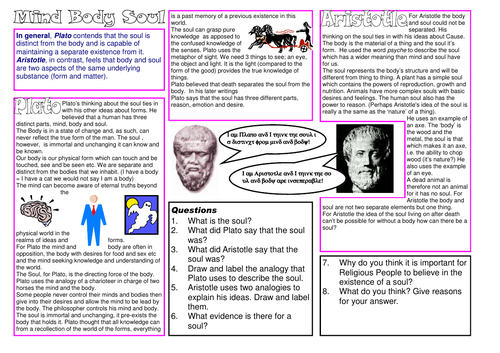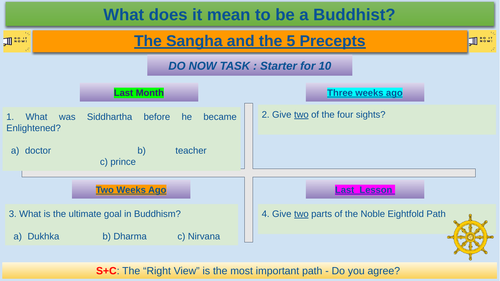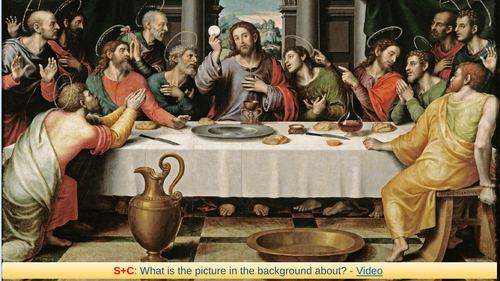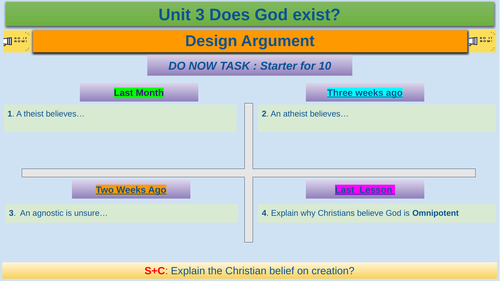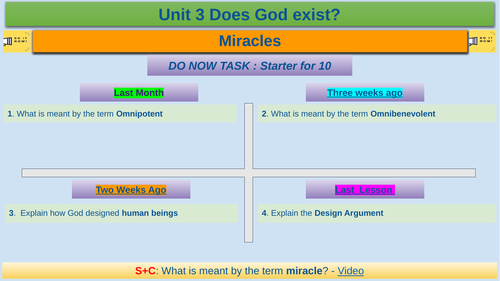
221Uploads
35k+Views
7k+Downloads
Religious education

Euthanasia - Part 1 - AQA - Religious Studies GCSE
Resource includes PowerPoint presention and differentiated worksheets for a 1 hour lesson, following the AQA specification.
Component 2: Thematic studies
Theme B
L1 - The origins of the universe and life (Christianity)
L2 - The origins of human life (Christianity)
L3 - The Origins of the universe Religious - Islam
L4 - Abuse of the environment
L5 - Abuse of animals
L6 - When Does Life Begin
L7 - Abortion - Controversy
L8 - Abortion Religious Viewpoint
L9 - Euthanasia Controversy
L10 - Euthanasia Religious Views
L11 - The Afterlife
L12- Assessment

Prayer - AQA - Religious Studies GCSE
Resource includes PowerPoint presention and differentiated worksheets for a 1 hour lesson, following the AQA specification.
Component 1: The study of religions: beliefs, teachings and practices
Christian Practices
L1 - Forms of Worship - Part 1
L2 - Forms of Worship - Part 2
L3 - Prayer
L4 - The Sacraments
L5 - The Sacraments
L6 - Baptism + Eucharist
L7 - Pilgrimage
L8 - Celebrating Festivals
L9 - Role of Church
L11 - Church Growth
L12 - Poverty and Charities
L13 - New Testament Responses to Persecutions and Reconciliation
L14 - Assessment

Shia (Ten Obligatory Acts) - AQA - Religious Studies GCSE
Resource includes PowerPoint presention and differentiated worksheets for a 1 hour lesson, following the AQA specification.
Component 1: The study of religions: beliefs, teachings and practices
Islam Practices
L1 - Five Pillars - Part 1
L2 - Five Pillars - Part 2
L3 - Five Pillar - Part 3
L4 - Shia - Ten Obligatory Acts
L5 - Shia (Contrasting Beliefs)
L6 - The Mosque
L7 - Jihad
L8 - Festivals (Eid-Ul-Fitr, Eid-ul-Adha and Ashura)
L9 - Assessment

Violent Protests - AQA - Religious Studies GCSE
Resource includes PowerPoint presention and differentiated worksheets for a 1 hour lesson, following the AQA specification.
Component 2: Thematic studies
Theme D
L1 - Forgiveness and Reconciliation
L2 - Pacifism and Peacekeeping
**L3 - Violent Protests **
L4 - Terrorism
L5- Consequences and Victims of War
L6 - Weapons of Mass Destruction and Nuclear Weapons
L7 - Holy War and Just War
L8 - Assessment
L9 - DiRT

Nature and Purpose of Families - AQA - Religious Studies GCSE
Resource includes PowerPoint presention and differentiated worksheets for a 1 hour lesson, following the AQA specification.
Component 2: Thematic studies
Theme A
L1 - Human Sexuality
L2- Nature and Purpose of Marriage
L3 - Sexual Relationships before and outside Marriage (Cohabitation) - Christianity
L4 - Sexual Relationships before and outside Marriage (Cohabitation) - Islam
**L5 - Nature and Purpose of Families **
L6 - Contraception and Family Planning
L7 - Divorce and Remarriage - Christianity
L8 - Divorce and Remarriage (Islam)
L9 - Gender equality and prejudice (Christianity)
L10 - Assessment
L11 - DiRT

The Soul
KS3 Philosophy and Ethics - Unit 2 - Religious Laws
Students will be able to:
To describe what is meant by the soul
To explore different beliefs about the soul
To evaluate these beliefs about the soul against each other
Feedback is welcome, please check out the rest of my lessons in the Science and Religion Scheme of Work!

Creation - AQA - Religious Studies GCSE
Resource includes PowerPoint presention and differentiated worksheets for a 1 hour lesson, following the AQA specification.
Component 1: The study of religions: beliefs, teachings and practices
Christianity Beliefs and teachings
L1 - Nature of God (Part 1)
L2 - Evil and Suffering - Part 1
L3 - Evil and Suffering Part 2
L4 - The Trinity
L5 - Creation
L6 - The Trinity + Creation
L7 - Contrasting viewpoints on Creation
L8 - The Incarnation
L9 - The Crucifixion
L10 - Resurrection and Asension
L11 - The Role of Christ in Salvation
L12 - Christian ideas of the afterlife
L13 - Assessment

Gender equality and prejudice - AQA - Religious Studies GCSE
Resource includes PowerPoint presention and differentiated worksheets for a 1 hour lesson, following the AQA specification.
Component 2: Thematic studies
Theme A
L1 - Human Sexuality
L2- Nature and Purpose of Marriage
L3 - Sexual Relationships before and outside Marriage (Cohabitation) - Christianity
L4 - Sexual Relationships before and outside Marriage (Cohabitation) - Islam
L5 - Nature and Purpose of Families
L6 - Contraception and Family Planning
L7 - Divorce and Remarriage - Christianity
L8 - Divorce and Remarriage (Islam)
**L9 - Gender equality and prejudice **
L10 - Assessment
L11 - DiRT

Contraception and Family Planning - AQA - Religious Studies GCSE
Resource includes PowerPoint presention and differentiated worksheets for a 1 hour lesson, following the AQA specification.
Component 2: Thematic studies
Theme A
L1 - Human Sexuality
L2- Nature and Purpose of Marriage
L3 - Sexual Relationships before and outside Marriage (Cohabitation) - Christianity
L4 - Sexual Relationships before and outside Marriage (Cohabitation) - Islam
L5 - Nature and Purpose of Families
L6 - Contraception and Family Planning
L7 - Divorce and Remarriage - Christianity
L8 - Divorce and Remarriage (Islam)
L9 - Gender equality and prejudice (Christianity)
L10 - Assessment
L11 - DiRT

Festivals (Eid-Ul-Fitr, Eid-ul-Adha and Ashura) - AQA - Religious Studies GCSE
Resource includes PowerPoint presention and differentiated worksheets for a 1 hour lesson, following the AQA specification.
Component 1: The study of religions: beliefs, teachings and practices
Islam Practices
L1 - Five Pillars - Part 1
L2 - Five Pillars - Part 2
L3 - Five Pillar - Part 3
L4 - Shia - Ten Obligatory Acts
L5 - Shia (Contrasting Beliefs)
L6 - The Mosque
L7 - Jihad
L8 - Festivals (Eid-Ul-Fitr, Eid-ul-Adha and Ashura)
L9 - Assessment

Human Sexuality - AQA - Religious Studies GCSE
Resource includes PowerPoint presention and differentiated worksheets for a 1 hour lesson, following the AQA specification.
Component 2: Thematic studies
Theme A
L1 - Human Sexuality
L2- Nature and Purpose of Marriage
L3 - Sexual Relationships before and outside Marriage (Cohabitation) - Christainity
L4 - Sexual Relationships before and outside Marriage (Cohabitation) - Islam
L5 - Nature and Purpose of Families (record via google meet)
L6 - Contraception and Family Planning (record via google meet)
L7 - Divorce and Remarriage - Christianity
L8 - Divorce and Remarriage (Islam)
L9 - Gender equality and prejudice (Christianity)
L10 - Assessment
L11 - DiRT

The Sangha and the 5 Precepts
KS3 Philosophy and Ethics - Unit 1- Evil and Suffering
Students will be able to:
To identify the Five Precepts
To explain the day in a life of the Sangha
To evaluate the need for the Sangha to have additional moral codes
Feedback is welcome, please check out the rest of my lessons in the Science and Religion Scheme of Work!

Aims of Punishment - AQA - Religious Studies GCSE
Resource includes PowerPoint presention and differentiated worksheets for a 1 hour lesson, following the AQA specification.
Component 2: Thematic studies
Theme E
L1 - Good and Evil Intentions
L2 - Different types of crime
L3 - Reasons for Crime - Part 1
L4 - Reasons for Crime - Part 2
L5 - Aims of Punishment
L6 - Types of Punishment
L7 - Religious attitudes towards Types of Punishment
L8 - Religious attitudes to Fogiveness

The life of the Prophet Muhammad - AQA - Religious Studies GCSE
Resource includes PowerPoint presention and differentiated worksheets for a 1 hour lesson, following the AQA specification.
Component 1: The study of religions: beliefs, teachings and practices
Islam Beliefs and teachings
L1 - The Nature of Allah (Part 1)
L2 - The Nature of Allah (Part 2)
L3 - Risalah - Adam
L4 - Risalah (Ibrahim)
L5 - The life of the Prophet Muhammad
L6 - Diversity in Islam
L7 - The six articles of faith in Sunni Islam
L8 - The five roots of Usul as-Din in Shi’a Islam
L9 - The Qur’an
L10 - Other Holy Books
L11 - Angels
L12 - Life After Death
L13 - Assessment
L14 - DiRT

Christian attitudes towards poverty - AQA - Religious Studies GCSE
Resource includes PowerPoint presention and differentiated worksheets for a 1 hour lesson, following the AQA specification.
Component 1: The study of religions: beliefs, teachings and practices
Christian Practices
L1 - Forms of Worship - Part 1
L2 - Forms of Worship - Part 2
L3 - Prayer
L4 - The Sacraments - Part 1
L5 - The Sacraments - Part 2
L6 - Baptism + Eucharist
L7 - Pilgrimage
L8 - Celebrating Festivals
L9 - Role of Church
L10 - Church Growth
L11 - Poverty and Charities
L12 - New Testament Responses to Persecutions and Reconciliation
L13 - Assessment

Forgiveness and Reconciliation - AQA - Religious Studies GCSE
Resource includes PowerPoint presention and differentiated worksheets for a 1 hour lesson, following the AQA specification.
Component 2: Thematic studies
Theme D
L1 - Forgiveness and Reconciliation
L2 - Pacifism and Peacekeeping
L3 - Violent Protests
L4 - Terrorism
L5- Consequences and Victims of War
L6 - Weapons of Mass Destruction and Nuclear Weapons
L7 - Holy War and Just War
L8 - Assessment
L9 - DiRT

Terrorism - AQA - Religious Studies GCSE
Resource includes PowerPoint presention and differentiated worksheets for a 1 hour lesson, following the AQA specification.
Component 2: Thematic studies
Theme D
L1 - Forgiveness and Reconciliation
L2 - Pacifism and Peacekeeping
L3 - Violent Protests
L4 - Terrorism
L5- Consequences and Victims of War
L6 - Weapons of Mass Destruction and Nuclear Weapons
L7 - Holy War and Just War
L8 - Assessment
L9 - DiRT

Eucharist
KS3 Philosophy and Ethics - Unit 2: What does it mean to Belong?
Students will be able to:
To identify what is meant by the Eucharist
To explain its importance to Christians
To evaluate different beliefs about the Eucharist
Feedback is welcome, please check out the rest of my lessons in the Science and Religion Scheme of Work!

Design Argument
KS3 Philosophy and Ethics - Unit 3 Does God exist?
Students will be able to:
To Identify the Christian beliefs on creation
To explain how Christians justify their beliefs on creation
To evaluate religious and scientific beliefs on creation
Feedback is welcome, please check out the rest of my lessons in the Science and Religion Scheme of Work!

Miracles
KS3 Philosophy and Ethics - Unit 3 Does God exist?
Students will be able to:
To describe the different understanding of the word miracle
To explain the arguments for and against miracles
To evaluate whether miracles prove the existence of God
Feedback is welcome, please check out the rest of my lessons in the Science and Religion Scheme of Work!






